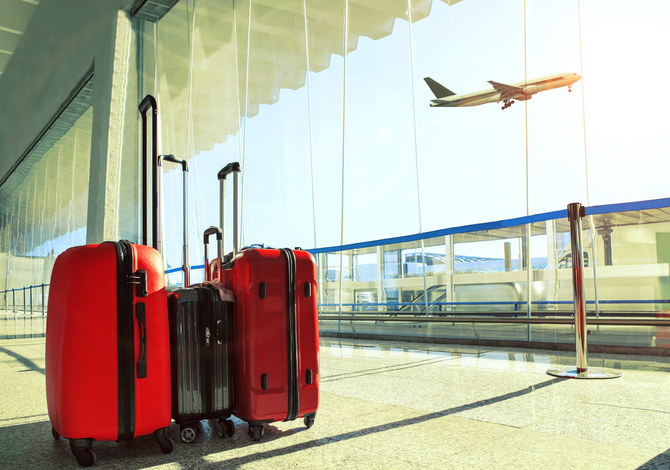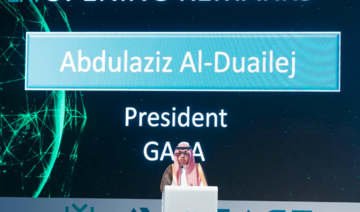Whether helping climbers reach challenging heights or drafting a troublesome passage of a controversial communique, the job of a sherpa is to do the heavy lifting for the main actors in an ambitious venture.
While Abdulmohsen AlGhannem did not have to carry any heavy physical burdens over the past year as sherpa for the U20 track of the G20, when the final communique was issued, it was the culmination of a long period of demanding work. You might almost imagine him planting a flag on top of the final document, like a climber at the summit of Everest.
“It was a year-long process for the Riyadh chairmanship,” he told Arab News. “We had to understand the ecosystem of the G20 as a whole and the U20 within that, and find out what our role was.”
The U20 specializes in urban issues, and it is a comparatively new element in the G20 set-up.
Whereas the G20 in its present form grew out of the global financial crisis of 2009 and the need for a coordinated response to that emergency, and has been performing the role of global economic and financial overseer ever since, the U20 was only established in Buenos Aires in 2018, and continued in Tokyo last year.
Focusing on the world’s great cities was a natural extension of the G20’s work. Around 55 percent of the world’s population lives in cities or big urban conurbations, and they generate nearly 80 percent of global gross domestic product.
At the same time, however, cities also typify many of the most intractable challenges that the world faces today. They consume a disproportionate amount of energy, they are more vulnerable than other areas to climate change issues, and they are the locations of some of the biggest economic inequalities on the planet with all the social problems that accompany that.
In 2020, cities have also been rocked by the COVID-19 pandemic, and have suffered big hits to traditional urban economic life through lockdowns and migration away from centers of infection.
That presented a new set of challenges for Riyadh, which was hosting the U20 under the chairmanship of Fahd Al-Rasheed, and for AlGhannem.
“When you look at it from the perspective of the U20, you see that local governments form the closest form of governance that touches residents’ lives on a daily basis,” AlGhannem said.
The U20 is just one track of a set of “engagement groups” beneath the main G20 apparatus.
Others deal with specialist areas such as business, science, womens’ and youth issues.
“Something that we were able to achieve this year that has not been done before in the U20 has been greater collaboration with other engagement groups, and all of these subjects are things that cities deal with on a daily basis. So we are able to understand their priorities as well as ours.
BIO
Born: Riyadh, 1988
Education: Graduate in urban planning, California State University
Career
- Internship, City of Calabasas, Los Angeles
- Urban Planner, Royal Commission for Riyadh City
- U20 Sherpa to G20
“As a young engagement group, there was not a lot of structure to the U20. So part of our time was invested this year in creating some structure. This is something the cities really appreciate. We sit together and exchange technical viewpoints, our experiences, how we tackle our problems, at an experts’ level,” he said.
In addition to the 20 cities representing the G20 members, this year there were 22 other urban centers as invited observers, as well as “knowledge partners” such as the UN Habitat and World Bank and experts from academia, urban planning and finance.
One of the innovations of the Riyadh U20 was the creation of task forces to coordinate the main thematic subject matter of the event. Even back in February, when the task forces were set up but before the pandemic forced an end to air travel, the task forces were designed to be virtual meetings.
“That was fortunate, but it also coincided with one of our main priorities in the U20, which was to use technology and innovation to share our experiences.”
The task forces were themed along three main lines: Working toward a circular carbon-neutral economy, the need for inclusive prosperity in cities, and the ambition to reach nature-based solutions in urban environments.
The strategy was to localize the effort toward the UN’s Sustainable Development Goals through innovation and — especially important — to generate the financial resources to do so.
Carbon neutrality is of special interest to Saudi Arabia, where it chimes both with national energy policy and with the strategy of Riyadh, where AlGhannem was an urban planner before the U20 called him in as sherpa.
“Riyadh is planting 7.5 million trees — one per resident — to help with carbon sequestration, which is one of the elements of carbon neutrality. We are supportive of national government aims, of course, but also want to engage with private business and with citizens. The tree-planting program does that.”
He reported good progress in discussions with financial institutions backing the U20 aims, and said that projects such as tree-planting had important benefits for bigger sectors such as infrastructure investment and water projects in an arid city like Riyadh.
“Innovative financing and investments are on every city’s top priority list. When it comes to money, we are definitely talking to the right people — the G20 leaders of the world’s biggest economies.”
So the job of sherpa, with liaison between multiple U20 participants, task forces and engagement groups, is a time-consuming and demanding one. But in the end it all boils down to the push to the summit after all that preparation is over — the final negotiations and compromises that enable all parties to agree to a communique encapsulating their positions, but which is also inclusive enough to accommodate often wide-ranging views.
It requires a large measure of empathy and diplomacy.
“The communique for us is the final document that synthesizes everything that we put into it, and we have to have consensus. We have 42 cities, so this can be a difficult task.”
Preparation was crucial. All 42 cities were involved in the process since February, when they were presented with a skeleton of how the final communique should look, and they were kept updated throughout the process.
“Giving the cities clarity on the process makes them your partners in achieving success. That’s why I keep thanking them, because them understanding the process made the job a lot easier to get consensus among them.”
In the end, the U20 was able to claim a record level of agreement in its final communique, with 39 of the 42 cities signing up by the communique deadline.
“It’s a huge success,” AlGhannem said, adding that some cities were distracted this year by climate challenges and — above all — the pandemic’s impact. “They wanted to be vigilant about the rate of spread of COVID and they wanted to keep it under control, which is very understandable.”
Now that he has successfully led the U20 to the summit, AlGhannem will resume his role as an urban planner with the Royal Commission — “my dream job” — where there is a very important project to deliver.
He has been involved in the transit section of the department for urban and strategic planning, which is responsible for the long-awaited opening of the Riyadh Metro, regarded as a crucial element of the city’s ambitious plans to double its population over the next 10 years.
“Having this public transportation will give us the opportunity to increase density around the stations, diversify land use and transform the city from being car to transit-oriented. It’s a big task.”
He will also get involved in the “troika” arrangements for the next G20, where previous G20 presidencies (Japan) work with the current one (Saudi Arabia) to assist the future host: Italy in 2021.
“We will be very supportive. We have invested a lot of time, money, sleepless nights and gallons of coffee to work on this U20, so we will not stop that. We will continue the momentum and support that.”






















